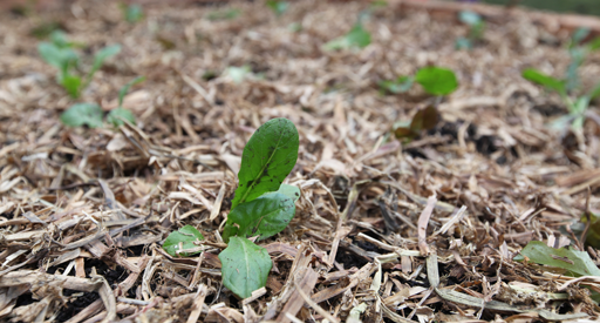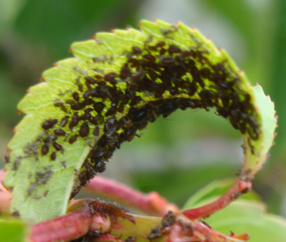
Make the most of end of season crops and make sure your garden is healthy for next spring. Part of this is getting rid of unwanted bugs and diseases which can ruin your carefully tended plants before you get the chance to enjoy them!
Check your existing crops
- Pull out any weeds and any plants you no longer need.
- Slugs and snails will be about at this time of year. The nemesis of many a leafy crop such as lettuce, cabbage, cauliflower and spinach as well as our much loved garden plants such as hostas, renga renga, agapanthus and begonias. Go on a snail hunt from time to time to pull them out of the garden - a good time to do this is in the evening with a torch, and apply Tui Quash slug and snail control to help stop them munching on your plants.
- Give your plants an application of Tui Organic Seaweed Plant Tonic, when applied regularly this helps strengthen plants against temperature extremes including frost.
- It's also a good idea to add a layer of Tui Pea Straw Mulch around your veges as this will help retain moisture, stop weeds popping up, and keep the roots protected from extremes in temperature. Add mulch before the ground freezes as otherwise the mulch will insulate the frost.
Planting and care tips
Prevention is the best cure, and this is true in your garden too. A healthy garden is less likely to be plagued by insect pests and diseases.
- Take care to choose the right plant for the right position in your garden, and plant seasonally appropriate varieties.
- Check out our for suggestions on what to plant in your region now.
- Add generous amounts of organic matter like Tui Sheep Pellets and compost to replenish soil nutrients before planting.
- Rotate crops - don't plant the same crops in the same place each year, as diseases can be harboured in the soil.
- Plant a variety of crops together rather than bulk planting a single variety - see the Tui Companion Planting Guide for more information.
- Replenish nutrients used by plants during the growing season. Keep adding organic matter like sheep pellets and compost to your soil, and feed your plants with a general fertiliser or one specially blended for your plant or crop.
- Start preparing strawberry beds for planting in June and July. Trim back the older leaves on existing plants and remove runners. Follow the handy video here to discover how to plant out your runners for more strawberries this summer!
- Keep your garden well-watered. Regular deep soakings are better than shallow watering. Water early in the day or later in the evening, taking care to water the soil not the foliage.
- Remove any diseased plant material, and either burn or bin – don’t compost to avoid spreading disease.
- Clean and disinfect all gardening tools, especially cutting tools, to prevent the spread of disease.
Common insect pests and diseases

Aphids and whitefly
These insects simply suck the life out of plants, as they survive on a diet of chlorophyll and sap.
Aphids - small pear-shaped soft body sap sucking insects that are often found on the underside of leaves. They can be green, black, yellow or grey.
Whitefly - tiny white sap sucking insects that fly when leaves are brushed, often found on the underside of leaves.
- Solve it: Blast most of them off with the hose to limit the number immediately and then spray with warm soapy water. If the infestation is large you can spray with an insect spray registered to control aphids and whitefly.
Scale
These dome shaped sap sucking insects are so tiny and have the ability to evade you for quite some time because the damage is hard to spot, by the time you do notice it the problem its generally wide spread.
- Solve it: If you manage to catch it early on, you can scrape away scale with your fingernail.
Black Spot
Black spots appear on leaves, surrounded by a yellow border and especially common in warm wet weather.
- Solve it: Limit the risk by clearing away pruning’s of diseased leaves and plant material straight away. If required, sprays are available from your local garden centre.
Post a comment
Winter Garden Preparation Comments
Cab you please update this page to include white moth? This pest has been rife this last season and very difficult to eliminate. Many thanks!
Jacqueline Harris Hampton
Hi Jacqueline, thank you for your feedback. White butterfly are certainly a nuisance, particularly at this time of year! Tui currently does not have a product that eliminates the white butterfly, but we do recommend using derris dust - available at your local garden centre. Thanks Jenna - Tui Team
jenna
Im a very good vege gardener and would like any up dates of product on your shelves.
Desmond Taikato
Hi Desmond thanks for your message, that is great to hear! You can subscribe to our fortnightly newsletter on our homepage for gardening ideas & inspiration and product information :) Thanks, Tui Team
jenna
looking for away of controlling weeds on my vege garden
carol wright
Hi Carol, mulch is a good way to help suppress weeds - Tui Pea Straw Mulch or Tui Mulch & Feed. The weather has been ideal for weeds to grow lately! Thanks, Tui Team
jenna
How do i get rid of or at least control brown rot in my apricot tree
Keith Hawkins
Is there anything I can do to keep rust from reappearing during winter?
Linda Grant
I am new at all of this gardening stuff, and pulled out some caulking and cabbage with whitefly, unfortunately I chopped them up and put in my compost what can I put in my compost to eradicate whitefly bugs??
Claire
Hi Keith, this is a dreadful problem and now is the right time to help limit its life cycle. Keep a close eye on your tree and as soon as the flowers appear spray with a product that is registered to control brown rot, check at your local garden stores for a suitable product. The other thing to do is to remove any fallen fruit from under the tree in summer, if left on the ground the spores sit doormat until summer arrives, then spread back into the tree. Hope that helps ^Tui Team
jenna
Hi Linda, rust is prevalent and readily spreadable during moist cold periods and when many plants are shedding their leaves over winter. Rake up affected leaves and cut back plants which have rust damaged leaves, this will limit the spread, then spray with a winter clean up spray registered to control rust. When applying a spray treatment, you must ensure the spray covers both sides of the leaves. All the best ^Tui Team
jenna
Hi Claire, over winter whitefly tend to disappear in cold climates. For them to survive the cold they need a sheltered environment and some soft foliage to nestle under. If you have neither of these things in your compost heap it shouldn?t be a problem. If your compost heap isn?t overly hot, cover it with a plastic cover, and this will help heat the pile up and kill any overwintering whitefly eggs. ^Tui Team
jenna
thank you
HJS
Hi, what is the best way to control white fly organically?
Brenda Butler
Hi Brenda, white fly are sucking insects that are prevalent in spring, summer and autumn and can be very hard to control as they multiply rapidly, the secret to control is being able to break the lifecycle. Use a natural plant based botanical spraying oil which is safe to use around beneficial insects such as ladybirds and bees, ensure the underside of the leaf is well covered as that is where they hide, ask at your local garden centre for a suitable control. Plant companion plants in your garden that repel white fly such as nasturtium, marigolds and sweet basil. Make sure your garden is well watered during the growing season to keep plants actively growing as this helps keep insect pests at bay, mulch around your plants to help conserve soil moisture and add organic matter back into the soil. Keep your plants well fed and actively growing. Research on greenhouse crops affected by white fly showed that they were attracted to plants with certain nutrient deficiencies, whitefly attacked greenhouse tomatoes when magnesium and phosphorus were deficient. As an overall tonic for your garden feed your plants with Tui Organic Seaweed Plant Tonic this helps plants build up resistance to pests and diseases by strengthening the cell wall of the plant, it is harder for sucking insects to pierce the leaf surface. Keep beds weed free, weeds can be a host to white fly, especially in winter in warmer regions.
Lianne